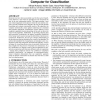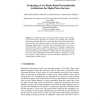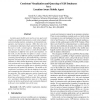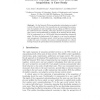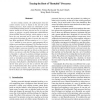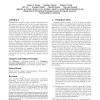132
click to vote
KDD
2000
ACM
15 years 6 months ago
2000
ACM
Decision trees have been successfully used for the task of classification. However, state-of-the-art algorithms do not incorporate the user in the tree construction process. This ...
114
click to vote
ISMIR
2000
Springer
15 years 6 months ago
2000
Springer
To make multimedia data easily retrieved, we use metadata to describe the information, so that search engines or other information filter tools can effectively and efficiently loc...
105
click to vote
ERCIMDL
2000
Springer
15 years 6 months ago
2000
Springer
Abstract. An architecture that provides personalised filtering and dissemination of news items is presented. It is based on user profiles and it provides mechanisms that allow the ...
114
click to vote
CGI
2003
IEEE
15 years 6 months ago
2003
IEEE
Location-aware mobile users need to access, query, and visualize, geographic information in a wide variety of applications including tourism, navigation, environmental management,...
121
Voted
ESWS
2006
Springer
15 years 6 months ago
2006
Springer
On the Semantic Web personalization technologies are needed to deal with user diversity. Our research aims at maximising the automation of acquisition of user knowledge, thus provi...
143
Voted
DEXAW
2006
IEEE
15 years 6 months ago
2006
IEEE
The current ever-growing evolution of mobile technologies suggests the possibility of accessing services, in an itinerant and ubiquitous way, through many kinds of mobile devices ...
92
Voted
ACSAC
2004
IEEE
15 years 6 months ago
2004
IEEE
In most existing systems, the authorization check for system resource access is based on the user ID of the running processes. Such systems are vulnerable to password stealing/cra...
113
click to vote
EXPCS
2007
15 years 6 months ago
2007
Experimental computer systems research typically ignores the end-user, modeling him, if at all, in overly simple ways. We argue that this (1) results in inadequate performance eva...
118
click to vote
CSE
2009
IEEE
15 years 6 months ago
2009
IEEE
A user stores his personal files in a cloud, and retrieves them wherever and whenever he wants. For the sake of protecting the user data privacy and the user queries privacy, a use...
136
Voted
CIKM
2007
Springer
15 years 6 months ago
2007
Springer
Every user has a distinct background and a specific goal when searching for information on the Web. The goal of Web search personalization is to tailor search results to a particu...
